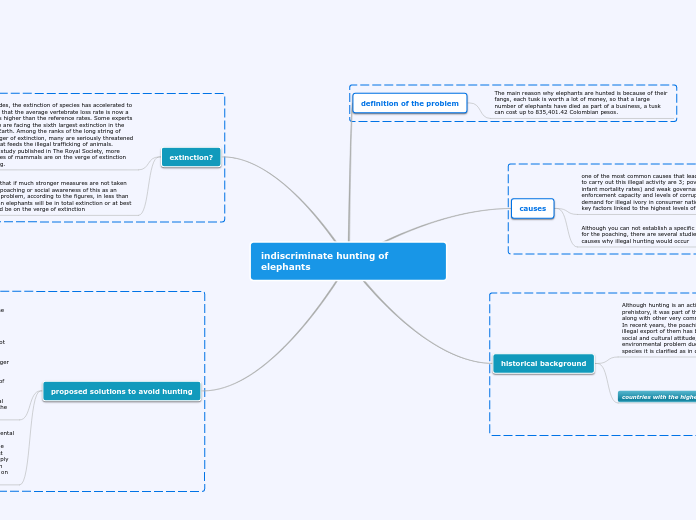indiscriminate hunting of elephants
proposed solutions to avoid hunting
While it is true that the best way to avoid these environmental catastrophes is education and good information on the subject, because there is too much false information in the media. A clear sign of the desperation of the African forest guards to show their disagreement and the failure to comply with all agreements against elephant hunting, was to burn more than 15 tons of ivory that would be commercialized on the black market.
There are measures to prevent poaching, such as:
-Increase the number of patrols and provide them with the necessary equipment to fight against poachers.
-Prohibit the commercialization of ivory.
-Fight against illegal trade in animals. If the hunters do not have a market, this activity will decrease.
- Stop buying products made with species that are in danger of extinction, such as their skins.
-Acquire products correctly certified by the governments of each country.
-Learn about threatened species and the problem of illegal hunting and trafficking. The more information you have, the more aware we will be of the problem.
extinction?
it is estimated that if much stronger measures are not taken with regard to poaching or social awareness of this as an environmental problem, according to the figures, in less than 50 years African elephants will be in total extinction or at best scenarios would be on the verge of extinction
In recent decades, the extinction of species has accelerated to such an extent that the average vertebrate loss rate is now a thousand times higher than the reference rates. Some experts believe that we are facing the sixth largest extinction in the history of the Earth. Among the ranks of the long string of animals in danger of extinction, many are seriously threatened by poaching that feeds the illegal trafficking of animals. According to a study published in The Royal Society, more than 300 species of mammals are on the verge of extinction due to poaching.
historical background
countries with the highest hunting rate
The country with the highest rate of illegal hunting of elephants is found in Africa, which has a large variety of species. the largest cup of elephant hunting occurs in southern Africa, in 3 areas more than 80% of the lefantes were stored, but which, however, were threatened by hunters and caused two of the three areas to decrease drastically in the number and, consequently, The main area, where 55% of these elephants were stored, was also attacked regardless of whether it was a natural reserve.
Although hunting is an activity that has been present since prehistory, it was part of the survival activities of the species, along with other very common, such as fishing or gathering. In recent years, the poaching of different animals and the illegal export of them has been a problem that has marked a social and cultural attitude, and has been positioned as an environmental problem due to one of the main reasons why a species it is clarified as in danger of extinction is hunting
According to studies carried out in recent years, the numbers of elephant fighter hunting are alarming. According to the figures given by the Secretariat of the Convention on International Trade in Endangered Species of Wild Fauna and Flora (CITES), more than 20,0000 eflefantes were illegally hunted to obtain their ivory, this being the highest figure in recent years
The figures are even more alarming because, in recent years, different synthetic materials have been produced with the hope of reducing the indiscriminate hunting of species for production purposes. but unfortunately only the increase in the figure has been achieved, because ivory being so difficult to obtain, it is much better traded on the black market and, therefore, it is better remunerated.
causes
Although you can not establish a specific and general reason for the poaching, there are several studies that defend three causes why illegal hunting would occur
1.Level of economic development of a society.
2.An opportunity to make a living in places where working conditions are extremely precarious.
3.The local and global market or the political and social situation of the country.
one of the most common causes that lead African inhabitants to carry out this illegal activity are 3; poverty (measured by infant mortality rates) and weak governance (measured by law enforcement capacity and levels of corruption), along with the demand for illegal ivory in consumer nations, are the three key factors linked to the highest levels of poaching.
definition of the problem
The main reason why elephants are hunted is because of their fangs, each tusk is worth a lot of money, so that a large number of elephants have died as part of a business, a tusk can cost up to 835,401.42 Colombian pesos.









